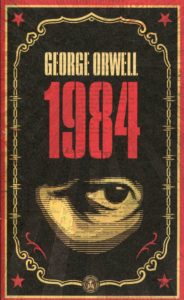Never again will you be capable of ordinary human feeling. Everything will be dead inside you. Never again will you be capable of love, or friendship, or joy of living, or laughter, or curiosity, or courage, or integrity. You will be hollow. We shall squeeze you empty and then we shall fill you with ourselves.—1984
This is what happens, perhaps, when you lose your right to read and think what you want.
 Big Brother, Newspeak, Doublethink—words that are now part of our everyday language—are words that George Orwell coined in 1984, his dystopian novel warning about the oppression of a totalitarian state, a “society robbed of free will, privacy and truth.” Last week marked the seventieth anniversary of the publication of that novel that still has meaning today.
Big Brother, Newspeak, Doublethink—words that are now part of our everyday language—are words that George Orwell coined in 1984, his dystopian novel warning about the oppression of a totalitarian state, a “society robbed of free will, privacy and truth.” Last week marked the seventieth anniversary of the publication of that novel that still has meaning today.
Warnings aside, this book that paints the dangers of censorship has been banned:
- in 2018 in China who declared the title 1984 a banned term when it was used in media discussions of the new constitutional amendment to end term limits for Chinese president Xi Jinping.
- in the USSR for being anti-communist,
- in 2008 in Jackson County, Florida, for being “procommunist,” and
- in 2017 at Rigby High School in Idaho, by a parent who challenged 1984 for using “violent, sexually-charged language” while the superintendent “questioned whether one passage of the book aligned with community goals, ideals, and institutions.”
One of the most challenged books in the years between 1965 and 1982, 1984 made the American Library Association’s list of commonly challenged books in 2008.
As a New Yorker commentary notes,
Orwell’s book was not intended as a book about life under Communism. It was intended as a warning about tendencies within liberal democracies, and that is how it has been read. The postwar Sovietization of Eastern Europe produced societies right out of Orwell’s pages, but American readers responded to 1984 as a book about loyalty oaths and McCarthyism. In the nineteen-seventies, it was used to comment on Nixon and Watergate. There was a bounce in readership in 1983-84—four million copies were sold that year—because, well, it was 1984. And in 2016 it got a bump from Trump.
Certainly, despite objections, the text has managed to live for these 70 years. NCTE even gives out awards based on Orwell’s writing:
- NCTE George Orwell Award for Distinguished Contribution to Honesty and Clarity in Public Language
- The Doublespeak Award an ironic tribute to public speakers who have perpetuated language that is grossly deceptive, evasive, euphemistic, confusing, or self-centered.
Watch this brief primer on the book:
Or listen to a long-version interpretation of 1984 as a “landmark of culture.”
Refer to the following blogs that focus on the right to think, write, and read:
“Nobody Has the Right to Tell You How to Write . . . How to Think”

